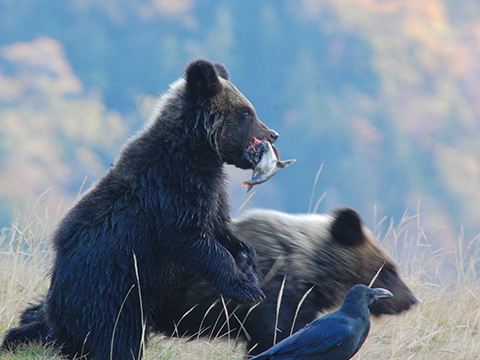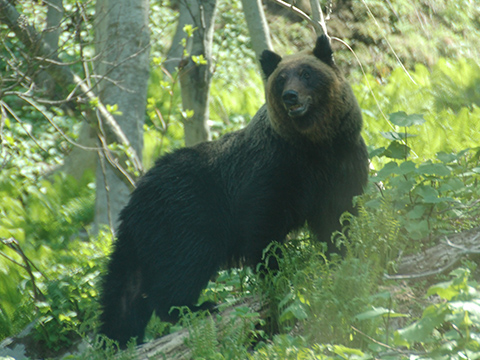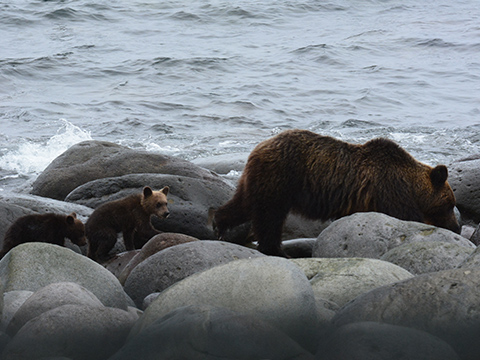Brown Bears: Avoiding Danger
About Brown Bears

Feeding habits
Brown bears are omnivorous. They consume large quantities of whatever food is readily available in each season. In spring and summer, they eat nettles, butterbur, Asian skunk cabbages, wild cherries, creeping pines, and ant and bee larvae, among other things. In autumn, they eat acorns, pink salmon, chum salmon, etc. to fatten and prepare for hibernation.
Behavior
Although brown bears are basically diurnal (active during the day), some individuals may be highly wary of humans or other brown bears and be more active at night. They are not territorial and multiple brown bears will gather in areas where food is abundant. During the mating season, adult males compete fiercely.
When natural food sources run low, they may feed on agricultural crops too. If they get a taste for human food that’s high in nutrients like dried fish and kitchen scraps, they may become dependent on them and do things like break into storage areas and stalk humans. In such cases, the bears can be very dangerous and there’s a high probability that someone could be harmed.
Hibernation (winter)
From December to March when food is low, brown bears hibernate in places like dens that they dig themselves. The body temperature of hibernating bears does not drop much, so they can be awoken by external stimuli. In eastern Hokkaido, there have been incidents in February where people have been attacked near their dens.
Avoiding Danger

Let bears know you are there
The most important thing you can do is to let brown bears know of your presence so that you can avoid sudden encounters. Some ways to do this include clapping your hands, calling out in a loud voice, or using a bear bell. There is still a possibility you may encounter a brown bear even when making noise. If the bear senses the presence of a person beforehand though, the risk of being attacked is low. Be particularly careful in places with poor visibility or where bears are likely to lurk, for example in forest brush. In such places, make noise before you enter the area, and occasionally stop and listen carefully to your surroundings.
Do not leave food or trash around
Brown bears have a sharp sense of smell. Trash like uneaten food, used food containers and drink bottles, etc. left outside attracts bears. It may also cause them to develop a taste for human food. Brown bears that feed on human food can be very dangerous and may even stalk people. Be sure to take your trash home with you. Absolutely never discard it outdoors or bury it.
Avoid being in the outdoors alone
Be especially careful in the early morning, at dusk, and at night when visibility is poor. If you’re alone, there’s a much lower chance of surviving an attack in the unlikely event one occurs. Whenever possible, go out as part of a group.
Be informed before you go
The entire Shiretoko National Park area is a brown bear habitat. Check in advance where bears have been seen. As much as possible, try to avoid areas with frequent sightings.
If You Encounter a Bear

Do not provoke them
Brown bears may feel uneasy and get agitated if they encounter a human. Making a lot of noise, moving suddenly, running away with your back to a brown bear, or approaching one are all extremely dangerous.
Do not stop or get out of your vehicle
You may encounter brown bears while driving at Shiretoko. If you see one on the side of the road, do not stop or get out of your car. Stopping just because you want to watch the bear can back up traffic when done for an extended period and may even cause an accident. Never get out of your vehicle and approach a brown bear. This could lead to serious injury or death.
Do not approach them
Brown bears are all unique and they behave differently in different circumstances. Many of them are intolerant of humans and won’t stand for you getting close. Also, if you see cubs, a mother bear will almost always be nearby. Even if you inadvertently get close to the cubs, the mother will try to protect them, leading to an attack that may result in injury or death. Never approach cubs as it’s extremely dangerous.
Leave quietly
If you are far enough away from the bear, quietly leave the area. Do not run or make noise. If it is close, do not turn your back on it. Keep facing it and slowly back away. Brown bears have an instinct to chase fleeing animals. If a bear is right near you, keep perfectly still. Wait for it to move on before you leave the area. Also, brown bears consider things they take as their own. If you try to retrieve something that has been taken, you will get attacked. Absolutely never do this.
If a brown bear approaches you
Brown bears can run up to 50 km an hour, and are experts at climbing trees and swimming. Escaping by running is difficult, but do not panic. Slowly put distance between yourself and the bear while preparing your bear spray for use. If the bear gets in close range, aim at its eyes and nose and discharge all of the spray at once. If physically attacked, curl your body up on the ground and protect your head and neck with both arms. This helps to prevent fatal injuries.